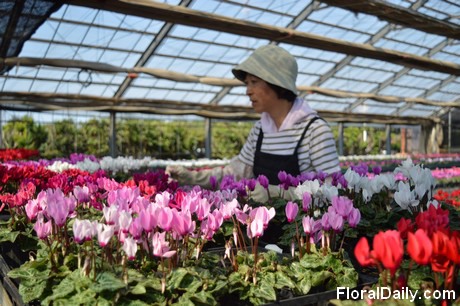
Photo taken at Ito Greenhouse, a friend of Oshio, who also grows cyclamen.
The rise of the cyclamen
In the late 19th century, people started growing cyclamen in Japan. According to Oshio, it started like a hobby but it became popular as business after the 2nd world war. "After the Olympics that were held in Tokyo in 1964, the Japanese economy flourished rapidly. In Japan, we have the custom to give a gift at the end of the year for thanking people around us. We usually give the important home goods like soap, towels, Chinese ceramics and so on. However, due to the growth of the Japanese economy, people changed to a more stylish life and started to build stylish homes and were eager to decorate them with flowers and greens. Then, the gifts changed from 'life goods' to 'mind food'. So, around 1970 many young people started growing Cyclamen as advantageous agriculture in Japan." And the demand for cyclamen was boosted with a song of a famous Japanese singer that was titled Scent of Cyclamen. "It became a mega hit in 1976 and a billion of cyclamen were produced afterwards. Cyclamen with large sized pot was becoming almost top of the gift items after this time and the price was about 5,000 yen (around 38 euro, regarding current exchange rate) sometimes 10,000 yen (76 euro)."
Decrease demand
However when the Japanese economy was settled, many other stylish gifts were born. The cyclamen was not a special gift anymore and according to Oshio, the prices at the auction started to decrease. "The prices decrease little by little every year. The balance of supply and demand is not equal, which means there is an overproduction of cyclamen." Oshio assumes that the change in society is an important reason of this change. "Those people who traditionally gave a cyclamen at work are now getting old and are retiring." Besides that, he sees less gift giving in the society and more purchases for themselves. "On top of that, young people do not spend on flowers so much like the older generation."
Quality and rare varieties
In Japan, quality and price are inextricably connected. The cyclamen in a 15 cm pot size, the average size in Japan, in poor quality receive auction prices that are over three times lower than high quality cyclamen (300 yen, around 2.5 euro) for poor quality cyclamen and 1,000 yen (7.5 euro) for high quality cyclamen. Besides high quality, rare varieties also receive high prices. "Japanese breeders are continuously trying to produce new Cyclamen. The bly cyclamen of breeder Suntory, for example, is becoming a hot topic this year. It is a blue cyclamen that is not dyed or anything and its price is 5000 yen (around 38 euro) in the retail shop".
Growers to change crop or resign
According to Oshio, many Cyclamen growers are not satisfied about the situation of the Cyclamen market and are therefore thinking to quit growing the crop and change to another crop. Besides that, many farms in Japan are family businesses and nowadays, these businesses are often not taken over by the next generation. "There are some silver age growers who resigned from horticulture."









